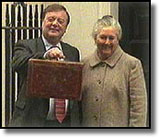
|
|
Neither Santa Claus nor Scrooge
|
November 1996 Budget
It was prudent, it was cautious, and with less than six months to go to a general election, Mr Clarke's budget managed to please both the public and the City without rocking the boat of economic recovery. Although, he said, he was unable to play Santa Claus, he was not going to play Scrooge.
The Quick Hits
- Mr Clarke took 1p off the basic rate of tax, widened the lowest tax band by �200 and increased the basic personal allowance by �280 to �4,045.
- He gave married couples an increase in tax allowance of �40 "so the system does recognise marriage".
- He put the price of cigarettes up, beer and wine prices were frozen, the price of spirits was cut and motorists were hit hard by increased fuel prices and car tax.
- The Chancellor said that a family on average earnings would be better off by �370 per year as a result of his measures, and reiterated the Conservatives' goal of a 20p basic rate of income tax.
- He announced increases in health and education spending but cuts in other areas of public spending.
On the whole, the November 1996 budget trod the fine line that allowed Mr Clarke to appear dynamic without actually having to do a great deal. His economic predictions painted the picture of a "Rolls-Royce" recovery, "built to last".
The contents of the budget itself had been
leaked to the Daily Mirror. The paper returned the documents to the Government, but revealed some of the main points and Tony Blair was able to make full use his prior knowledge in preparing his response to the Chancellor's 75-minute speech.

|
|
Clarke Charms Voters
|
Although the forthcoming election had created a degree of pressure from within his own party for Mr Clarke to court voters with a 2p reduction in income tax, he said, "This isn't a budget just for the next few months, it's a budget for many prosperous years to come and it's a budget that the Conservative Government will build upon again in 12 months time."
Mr Blair's response for the Opposition was characteristically biting. "Just like a Conservative government," he said, Mr Clarke was "giving with one hand to take away with the other." The budget was "all smoke and mirrors," said Mr Blair.
Mr Clarke said the reduction in the basic rate of tax by 1p to 23p was a continuation of "17 years of steady progress. This means the basic rate of tax is a full 10p lower than the rate we inherited in 1979." On the other hand the Mr Blair highlighted "22 Tory tax rises" since 1979 - a theme he was to return to repeatedly during the general election campaign.
Expert analysts said this budget was prudent and cautious, Mr Clarke was tweaking the economy a bit here and a bit there. His fiscal decisions left economic control in the hands of monetary policy, and left Mr Clarke to deal with the Governor of the Bank of England, Eddie George. He emphasised in his speech that "good economics is good politics", and this budget did indeed make good political sense. Despite Opposition claims of "smoke and mirrors", the budget succeded in reassuring both the public and the City that economic recovery was secure, and gave Mr Major a steady economic base on which to fight the General Election.
The Main Points...
- Basic tax rate down 1p to 23p
|
Spirits down 26p a bottle |
| Personal tax allowance up �280
|
Beer and wine unchanged
|
| 40p tax threshold up by �600
|
Alcopops up 7-8p a bottle
|
| 20p tax band widened by �200
|
|
|
|
Car tax disc up �5 to �145
|
| Cigars up 7p a packet |
Lorry tax disc unchanged
|
| Cigarettes up 15p a packet
|
Petrol and Diesel up 3p a litre
|
Air passenger duty rates increased: - from �5 to �10 on European flights
- from �10 to �20 on flights to the rest of the world
Inheritance tax threshold was raised to �215,000 (up by 40% in two years)
Capital Gains Tax thresholds were to be indexed with effect from April 1997
Spending on National Health Service patient services to go up by �1.6 billion in 1997, an increase of 2.9% in real terms
�450 million to be spent on combating crime in 1997, providing 2,000 new police officers by the end of the year
No increase for small businesses in the business rate of tax
Plans to increase spending on schools by �830 million in 1997
�280 million pledged to further and higher education over 1997-8
capital investment of �50 million for school buildings
Local councils and housing associations to lose �500 million from low-cost rented housing budgets
Plans for the Social Security budget to be curbed, with extra benefits for lone parents being phased out from 1998
Small companies' rate of corporation tax was reduced to 23% in line with the basic tax rate
Proposed rise in insurance premium tax to 4%
Budget History Index
Budgets
1733-1885,
1907-45,
1945-79,
1979-92
|





